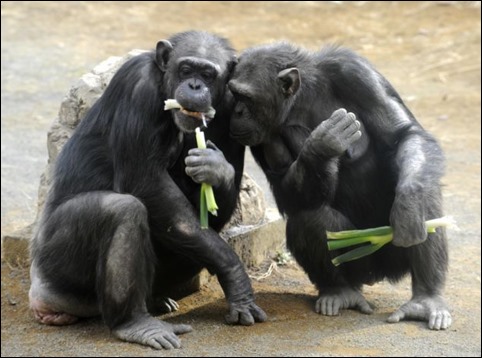Scientists once thought the sense of fairness was unique to humans, but now, for the first time, they have observed it in captive chimpanzees.
Researchers used a variation of the Ultimatum Game to study six adult chimpanzees and 20 human children, aged 2-7. Darby Proctor, Ph.D., says:
“We used the Ultimatum Game because it is the gold standard to determine the human sense of fairness. In the game, one individual needs to propose a reward division to another individual and then have that individual accept the proposition before both can obtain the rewards. Humans typically offer generous portions, such as 50 percent of the reward, to their partners, and that’s exactly what we recorded in our study with chimpanzees.”
In this variation, one chimpanzee offered another chimpanzee colored tokens that represented various reward outcomes. The first chimpanzee needed the cooperation and agreement of the other individual in order to cash in the tokens and reap the reward. One token could be exchanged for rewards in which both “players” received equal portions, while another token benefited one player over the other. One player chose the token “then needed to hand the token to the partner, who needed to exchange it with the experimenter for food. This way, both individuals needed to be in agreement.”
The chimpanzees and the children both displayed fairness and sharing when another individual participated and chose the selfish option of keeping the entire reward when no one else actively took part (e.g. a scientist observing the study). These responses were similar to how an adult human would behave.
The scientists also proved that another species could play the Ultimatum Test. As noted chimpanzee researcher, and co-author of the study, Frans de Waal, Ph.D., said:
“Until our study, the behavioral economics community assumed the Ultimatum Game could not be played with animals or that animals would choose only the most selfish option while playing. We’ve concluded that chimpanzees not only get very close to the human sense of fairness, but the animals may actually have exactly the same preferences as our own species.”
Chimpanzees in the wild have often been noted to cooperate with one another and evidence continues to point toward a highly developed notion of sensitivity toward others. These traits, believed to assist in development and evolution, are part of the basis of the primates’ “human-like” qualities. Experiments like the Ultimatum Game continue to prove that chimpanzees, and their human-like qualities, such as a sense of “fairness,” are evidence that they ought to possess the fundamental rights of legal personhood.